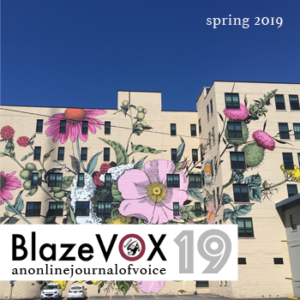IntroductionIntroduction
 Hello and welcome to the Spring issue of BlazeVOX 19. Presenting fine works of poetry, fiction, text art, visual poetry and arresting works of creative non-fiction written by authors from around world. Do have a look through the links below or browse through the whole issue in our Scribd embedded PDF, which you can download for free and take it with you anywhere on any device. Hurray!
Hello and welcome to the Spring issue of BlazeVOX 19. Presenting fine works of poetry, fiction, text art, visual poetry and arresting works of creative non-fiction written by authors from around world. Do have a look through the links below or browse through the whole issue in our Scribd embedded PDF, which you can download for free and take it with you anywhere on any device. Hurray!
In this issue, we seek to avoid answers but rather to ask questions. With a subtle minimalistic approach, this issue of BlazeVOX focuses on the idea of ‘public space’ and more specifically on spaces where anyone can do anything at any given moment: the non-private space, the non-privately owned space, space that is economically uninteresting. The works collected feature coincidental, accidental, and unexpected connections, which make it possible to revise literary history and, even better, to complement it.
Combining unrelated aspects lead to surprising analogies these pieces appear as dreamlike images in which fiction and reality meet, well-known tropes merge, meanings shift, past and present fuse. Time and memory always play a key role. In a search for new methods to ‘read the city,’ the texts reference post-colonial theory as well as the avant-garde or the post-modern and the left-wing democratic movement as a form of resistance against the logic of the capitalist market system.
Many of the works are about contact with architecture and essential living elements. Energy (heat, light, water), space, and landscape are examined in less obvious ways and sometimes developed in absurd ways. By creating situations and breaking the passivity of the spectator, to develop forms that do not follow logical criteria but are based only on subjective associations and formal parallels, which incite the viewer to make new personal associations. These pieces demonstrate how life extends beyond its own individual limits and often tells a story about the effects of global cultural interaction over the latter half of the twentieth century. It challenges the binaries we continually reconstruct between Self and Other, between our own ‘cannibal’ and ‘civilized’ selves. Enjoy!
Rich — Adam Druck
Bedbugs — Benjamin Joe
Aunt Viola Convalesces — Robert Wexelblatt
A light switch goes off — Beyeni Da
The River — Ana Vidosavljevic
Landlady — S.W. Campbell
Guiniver — William Pruitt
The Ordinary World — Barbara Gurgel
Good Girl — Nakahara Chuya
Translated from Japanese by Marissa Skeels
New & Forthcoming from BlazeVOX books
Light Reading By Stephan Delbos
The poems in Light Reading interrupt silence with whispers, occasional shouts, erasures’ spaces. Delbos’ lines resonate with startling spontaneity and sprezzatura. A master minimalist, he writes with risible daring and poignance. His mind’s at poetic play throughout these refreshing poems, leaping with erudition, oneiric strangeness, and Czech allusions that would charm Kafka. “Your brain a beehive” and “honey tastes like blood,” he writes in “Bagatelle for György Ligeti, Eternal Light & Honeycomb.” I love the buzz and blood of this book. —Chard deNiord
ocean plastic by Orchid Tierney
Each iteration ends with a last word: respectively, petromonster stomachs stomachs flesh filters gyres stomachs sympathy sympathy gyres gyres gyres gyres gyres nylon-riots. Which is to say, begin with the petromonster and the inevitable interconnection of all things will give even Buddha a stomach ache. One hopes we will riot against feeding the monster like nylon metaphorically protests against itself strangling the planet. For this poem, while powerful (and moving when chanted out loud), isn’t worth its root source. —Eileen R. Tabios
PERSONAL EFFECTS by TED PEARSON
Kierkegaard and Adorno find themselves adrift in a boat at sea, in either calm or turbulent weather. Kierkegaard: “Our position is existential; there are no hierarchies above the concept.” Adorno is committed to an experimental method that discerns a kernel of unalloyed existence at the heart of the concept. High in the masthead, Ted Pearson considers his advantage. “I will resolve this dilemma in an experimental poetry that constantly defers its commitment to experience through the undermining of its concept, in a rigorous fashion.” Adorno yells at him for the world to hear, “There is no leap of faith that is not negative.” —Barrett Watten, author of Plan B and Questions of Poetics
Songs of the Sun Amor by Wade Stevenson
These are poems about forgetting our past injustices, living in the present, and looking forward to the infinite love beyond this life; for, as we learn from the conclusion to “Promise of the After”: “God’s blow will finish my body hard as a hammer.” Meantime: “There is no ordinary, even Amor is extraordinary.” —Pank Magazine
“Martin Ott collects clickbait headlines and transmutes them into lyric truths.”
—Jesse Walker, Author of The United States of Paranoia
Emily Toder’s Waste is a meditation on loss, as all poetry is. But it is also an analysis of what is to be gained: days, months, years; human dignity; romantic love. The words on these pages are at turns quizzical, frustrated, ecstatic, and sad. The series is ultimately metaphysical in nature, marrying the spiritual and material in a warm, inquiring union of urbane lines. I really loved this book. The time that I spent reading it was time very well spent; my loss and gain. —Katy Lederer
Le Trouvere Pretendu by Peter Siedlecki
In the great tradition of troubadours whose guitars gently weep, Peter Siedlecki’s poems read like prayers to love and loss. From lyrical musings on memory to fully-scored musical compositions, Le Trouvère Prétendu hums with beauty, its heartbeat driving toward breathlessness. — Barbara Cole, Artistic Director Just Buffalo Literary Center
This brilliantly satirical and playfully experimental collection upends all expectations—Sunsphere is the perfect book for our absurdist times. Each story is a new philosophical labyrinth of delicious, Barthelme-style surprises. Don a pair of ironic (or earnest!) sunglasses, and enjoy this incredible book. —Alissa Nutting, author of Tampa and Made for Love
perimeter homespun by Marcia Arrieta
Marcia Arrieta’s perimeter homespun is part meditation, part equation. Both spare and delightfully baroque at the same time, the collection deftly explores the tensions between art and nature, the created world and the occurring one. Arrieta’s poems cast a splendid web around the work created by other artists and writers, their translations of the known and unknown, spinning everything into an amazing pattern that both catches and reflects light. —Kristy Bowen
Places: Things Heard. Things Seen by Bruce Jackson
Places: Things Heard. Things Seen unveils Bruce Jackson’s extraordinary career as a writer, photographer, and filmmaker. Jackson’s graphic prose and powerful photographs capture his childhood in the Bedford-Stuyvesant section of Brooklyn with Jewish grandmothers who spoke German, Yiddish, Russian, and Polish. We follow his travels to Mallorca, France, Italy, Alaska, to Texas prisons and Attica. And we meet his friends–poets Robert Creeley, John Berryman, and Robert Lowell, folklorists Alan Lomax and Pete Seeger, photographer Walker Evans, political activists William Kunstler and Herbert X. Blyden, and film historian James Card. At the age of 82, Jackson recalls his life in prose that is as richly detailed, as are his photographs. Places: Things Heard. Things Seen establishes Bruce Jackson as an American treasure. — William Ferris, The South in Color: A Visual Journal
Refugee: Six Rooms With Marc Chagall by Travis Cebula
In Refugee, Travis Cebula keys the ekphrastic to spiritual heights, and yet, like his subject Chagall, maintains ties to the earthly grotesqueries and terrors, beauties and delights, and awkward inbetweennesses in fugitive transit through which the divine is manifest. Description here is not passive but actively caresses the inside of the paintings –“[O]h, precious jewel./ Wounded soldier will you/ catch a river in your hand./ …” –a world in which to be wounded (blessé), hunted, haunted is also to be blessed by transfiguration: first into pigment, then into language. Such language. —Maria Damon, author of Postliterary America
Antibodies in the Alphabet by Linda King
King holds us to the mark, offering no easy way out. Perhaps her poems haunt us because they’re not so much about us as our relationship to the words we use to stand in for us. Her critical lyric examines its own modus operandi and although armed with impeccable word choices peppered with wry wit, she often threatens to throw it all away and let danger take the high road. This is a book acutely cognizant of language’s painful limitations and momentary exhilarations. As she says so eloquently “the unwavering of being/is the meaning we miss/every time.” —Charles Borkhuis, author of Dead Ringer
An Internet of Containment by Anne-Adele Wight
Anne-Adele Wight’s An Internet of Containment brings a tender, galactic imagination to our crisis here on earth in these post-human yet irreducibly mammalian poems. That there might be “something not quite finished” at the once-molten center of our beloved home, that we might yet “approximate a tidal roar,” that we might invoke the biological even in the cold space of skeletal remnants: these poems map the lines by which we might echolocate another future long after this one collapses underneath us. —Julia Bloch, author of Valley Fever
Leaving his lover, a man driving into the desert encounters a woman walking barefoot towards him on the Interstate. Is she fleeing an accident, or something worse? A salaryman, recalling his lost love, finds himself alone in the icy winter. An artist spots an unusual stain on his ceiling, coming from the apartment upstairs. Does he dare investigate? The elegant novella ‘Anhedonia’ traces the key moments of a relationship from its first hilarious meeting to its wistful final fading – seen through the eyes of a character incapable of feeling joy. These nine stories of love and its opposite, blend darkness, humor and a refreshing emotional openness. Briskly written and told with a winning humanity, Anhedonia is a fine collection from one of Ireland’s most exciting writers.



Comments (0)